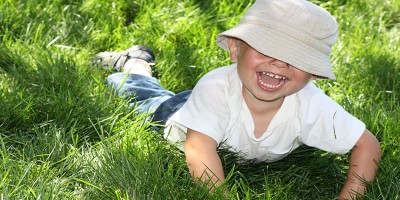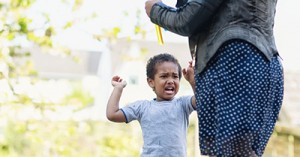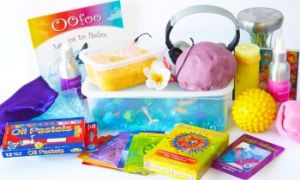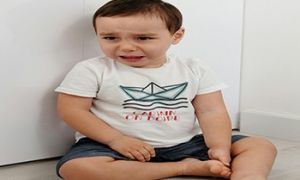Among the most significant indicators of emotional well-being is positive self-esteem. Like with many other cognitive and physical skills, self-esteem too develops as the result of interactions with environment and people. The following article provides information on What Is Self Esteem, How Self Esteem Develops, Self Esteem Strategies For Babies, Toddlers and Preschoolers.
What Is Self-Esteem?
At its simplest, self-esteem is liking yourself. It is feeling of being worthwhile, believing in yourself and knowing that while you may not be exceptionally gifted, intelligent, attractive or lucky, nevertheless you are unique with your own strengths, abilities and interests.
Self-esteem is sometimes confused with confidence; Though the two are linked, they are not identical. While confidence is the ability to explore and do things without feeling doubtful, self-esteem is feeling positive about and fully accepting one’s own self.
Self-esteem plays a huge role in ensuring positive outcomes for children. It does this by
- Encouraging children try new activities and experiences. Lack of self-esteem makes children hesitant and wary of exploring their environment and new activities. But learning happens only when children try things that are different or new. In this way self-esteem is key to learning and growth.
- Helping them to cope with disappointments. Setbacks are a feature of every human life but since children with higher self-esteem believe in their capabilities and therefore, bounce back more quickly. At the same time, having a sense of inner worth, helps a child accept their limitations with greater readiness and calm, rather than stressing about needing to be the best in every field.
- Nurturing relationships since when children are more assured about their own worth, they are less emotionally needy and can initiate and maintain relationships with greater equanimity.
How Does Self-Esteem Develop?
Babies
Human beings are not born with self-esteem; indeed babies have no awareness of being an entity in their own right and separate from the mother or primary caregiver. however even at this stage, the foundation of self-esteem can be created by building secure, loving attachments. When a baby feels safe and cared for, when they see adult caregivers responding to their smiles and gestures with joy and affection, they have a growing feeling of being worthy of love and attention and all this makes for the right conditions for the development of self-esteem.
Strategies include:
- caring for the baby gently
- respond when the baby cries
- give plenty of cuddles and smiles.
Toddlers
Toddlers begin to have a greater awareness of themselves as distinct beings. The more they explore their environment, try to use their bodies, limbs and faculties, they more they realise what they can and cannot do - all this feeds into their sense of self-worth.
Strategies include:
- Letting them explore their environment, but be ready to respond if they need you. For example, a child might be intrigued by the movements of an ant but frightened when the ant crawls on their foot. At this you can reassure them of their safety without going overboard by preventing them off from exploring their environment.
- Continuing to build trusting relationships with children. Though they are no longer babies, toddlers still seek comfort from close caregivers when upset or afraid and may start showing anxiety when separating from significant people in their lives. Knowing that they will always be loved, whether they fail or succeed, will give toddlers the emotional strength to explore new experiences, succeed and feel good about themselves.
- Allowing opportunities for more agency. For example, give the child access to safe, toddler-friendly options and then let them decide which toy to play with, or whether to have jam or vegemite on their toast. At the same time, give the child the chance to say ‘no’. Toddlers need to assert themselves and learn that decisions have consequences. For example, if a child refuses to have a snack, let them be – perhaps they are not really hungry or even if they are a little, waiting for the next suitable break will not hurt them. Giving toddlers more control over certain aspects of their lives helps them arrive at understandings, develop confidence and a sense of self.
- Giving them age-appropriate tasks. It makes sense to encourage children to be independent only when the tasks are age appropriate. This is because self-esteem is boosted by successful completion of tasks. So if a child is given a task that is much tougher than their developmental phase, they are likely to fail and lose confidence. For example, telling toddlers to write well-formed letters or tie shoelaces is inappropriate; instead they can be told to build blocks or colour big shapes.
- Guiding the child through tricky social situations. Toddlers may not be ready to share since they are still figuring out that others have rights and privileges as well. During this time, educators can help them build social skills by teaching turn taking, like by saying, ‘It’s my turn to have the red block now. Great sharing – well done!’. Such measures would help toddlers with positive engagement with peers which in turn is important to feel good about oneself.
Pre-schoolers
At this stage, children are fast expanding their network of friends and playmates. Thus there are now opportunities for comparison with others which can lead children to ask whether they’re the biggest, fastest or best at whatever they’re doing. Use stories, music, dance, games and various other experience to convey the message that each child is unique. Though they may have different skin colours, bodies, home languages, skills, abilities and styles, each one of them has something worthy to celebrate. This will help children to avoid getting caught up on what somebody else has – and they don’t – and instead focus on what they have and can be.
Strategies include:
- Letting them do things on their own. An adult may not even realize how much they are doing for children. Consider if the child is physically capable of wearing their jacket, carrying their backpack or serving their own food and if they can, let them do things for themselves. When you jump in and do something for the child that they can on their own, they are not only robbed of an opportunity to feel worthy but tempted to become lazier. Also look for age-appropriate responsibilities around the house or service like setting the table or putting away laundry. This shows your child that you trust them with responsibility, which helps your child feel good about themselves.
- Handling failures with care. The way trusted adults approach children’s setbacks is crucial to building their self-esteem. Whether a young child is learning to copy letter forms or using scissors to cut out a particular shape, there are bound to be ups and downs. It is important to allow children to fail so that they know such hiccups are a normal part of learning. this also teaches them to face up to unpleasant feelings and ways of dealing with them. At the same time, assure them that you are not abandoning them but will be around to offer support and encouragement so that they feel confident to try again. Be careful of some types of popular cultural representations which sees asking for help as a kind of failure. Children should know that asking for help if they need it is a desirable skill and actually shows strength of selfhood.
- Praising effort rather than achievements. Part of offering meaningful encouragement is knowing what to praise. Show appreciation to the child for trying out new things and putting in the effort rather than coming ‘first’. It eases the pressure of being the best and encourages them to appreciate other people’s successes too. For example, ‘Well done for racing and giving it your best try – you did great. Let’s congratulate Sven on winning’. At the same time, let children know
- Helping them to be internally motivated. So if a child succeeds at a task, instead of saying, “I am so proud of you”, say “You should be so proud of yourself”. Or when a child has cleaned up nicely, say “You cleaned up on your own, that must feel so nice” rather than, “I like that you cleaned up your space”. This will help a child draw on their own reserves of self-esteem when faced with challenging situations in future rather than feel inadequate when there is no adult around to offer validation.
Feeling confident in oneself is known as self esteem. Children that have high self-esteem are more likely to experiment, take calculated risks, and work through issues. It provides children with a strong foundation for learning and growth.
Further Reading
Erik Erikson Psychosocial Development - Erik Erikson developed a psychosocial theory to understand how we each develop our individual identities through eight stages of psychosocial development from infancy to adulthood.
Supporting Children Developing Friendships - Friendships, bring pleasure, comfort, and important opportunities to learn and develop in a social world. Friends, help children feel good about themselves, help the child adapt more easily to early childhood environments and help the child build self-confidence.
How Does Nature Affect A Child's Development - To be familiar with nature, to spend some time amid nature, talking, thinking about trees, grasses, pebbles, climates, small insects, ground warm enhance the resilience and self-esteem of a child.
Positive Affirmation Flashcards With Pictures - The following Positive Affirmations enable you to read them along with children. Saying positive affirmations will boost children's confidence, validates children's efforts, builds resilience maintain self-esteem, recognise their strengths and enables children to practice positivity.
Turning Children's Weaknesses Into Strengths - As Educators when communicating with Parents (through verbal or non-verbal communication), there will be times where we need to discuss issues or concerns that may arise. During this time, we may use negatives to describe the child's behavioural or personality traits (weaknesses) that they may be displaying
References:
- About Self Esteem, Raising Children
- Improving Self Esteem, Thought Co
- Self Esteem, Child Development and Family Centre







 Toddlers have a greater understanding of the world around them by this stage. Their cognitive development (also known as intellectual development and thinking skills) continues
Toddlers have a greater understanding of the world around them by this stage. Their cognitive development (also known as intellectual development and thinking skills) continues Infants begin to develop trust when parents begin to fulfil their needs. Such as changing an infant's nappy when needed, feeding on request and holding
Infants begin to develop trust when parents begin to fulfil their needs. Such as changing an infant's nappy when needed, feeding on request and holding Beginning at birth the construction of thought processes, such as memory, problem solving, exploration of objects etc, is an important part of an infant’s cognitive
Beginning at birth the construction of thought processes, such as memory, problem solving, exploration of objects etc, is an important part of an infant’s cognitive Toddlers want to do more on their own and do not like it when you begin to establish limits on their behaviour. Tantrums can become
Toddlers want to do more on their own and do not like it when you begin to establish limits on their behaviour. Tantrums can become Your preschooler is now able to focus their attention more accurately and is less influenced by distractions. The intensity of questions increase as your child
Your preschooler is now able to focus their attention more accurately and is less influenced by distractions. The intensity of questions increase as your child John Dewey is often seen as the proponent of learning by doing – rather than learning by passively receiving. He believed that each child was active,
John Dewey is often seen as the proponent of learning by doing – rather than learning by passively receiving. He believed that each child was active, Toddler advance and gains new skills in Gross Motor Development milestones achieved throughout earlier years. Co-ordination and challenges that could not be performed before such
Toddler advance and gains new skills in Gross Motor Development milestones achieved throughout earlier years. Co-ordination and challenges that could not be performed before such Erik Erikson developed a psychosocial theory to understand how we each develop our identities through eight stages of psychosocial development from infancy to adulthood. The
Erik Erikson developed a psychosocial theory to understand how we each develop our identities through eight stages of psychosocial development from infancy to adulthood. The At this point preschoolers begin to interact effectively with others. Play becomes more innovative and organized and “boyfriend” or “girlfriend” begins to emerge. Preschoolers have
At this point preschoolers begin to interact effectively with others. Play becomes more innovative and organized and “boyfriend” or “girlfriend” begins to emerge. Preschoolers have From now, babies begin to identify and respond to their own feelings, understanding other's feelings & needs and interact positively with others. A baby's social and
From now, babies begin to identify and respond to their own feelings, understanding other's feelings & needs and interact positively with others. A baby's social and


